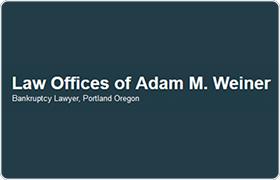Gales Creek Workout Lawyer, Oregon
Sponsored Law Firm
-
 x
x

Click For More Info:
-
Law Offices of Adam M. Weiner
8624 SE 13th Ave Portland, OR 97202» view mapBankruptcy & Debt Premier Bankruptcy Attorney
Life doesn’t always have to be hard. Consult with a bankruptcy attorney who looks out for your best interests. Call today to begin the process for a fresh financial start.
503-719-5123
Not enough matches for Gales Creek Workout lawyer.
Below are all Gales Creek Bankruptcy & Debt lawyers.
Karen Laree Manske
Landlord-Tenant, Business & Trade, Contract, Commercial Bankruptcy
Status: In Good Standing Licensed: 29 Years
James E Zwaanstra
Family Law, Business & Trade, Commercial Bankruptcy, Bankruptcy
Status: In Good Standing Licensed: 28 Years
 Adam M. Weiner Portland, OR
Adam M. Weiner Portland, OR Practice AreasExpertise
Practice AreasExpertise
